The Maple Leaf Centre for Food Security hosts its fifth annual Food Security Symposium
Sharing learnings and insights as we collectively seek to reduce food insecurity in Canada.
By Sarah Stern, Executive Director, Maple Leaf Centre for Food Security
On October 16, the Maple Leaf Centre for Food Security hosted our fifth annual Food Security Symposium with approximately 160 people from the private sector, civil society and governments attending. The day featured program experts, policymakers, community leaders, and researchers discussing various perspectives on what’s needed to address Canada’s food insecurity crisis.
We host our annual Symposium as a day to build connections and discuss learnings to drive action on this critical social issue.
Did you know that in Canada, almost 9 million people experienced food insecurity in 2023? And, across the country, one in four children are food insecure. Last week our Maple Leaf brand, in collaboration with the Centre, launched a new campaign to raise awareness about this heartbreaking reality: Let’s build a future where every kid can eat like a kid. It was a timely campaign that was released not only on the day of our Symposium, but on World Food Day as well.
In my opening remarks I noted that food insecurity in Canada is a deeply entrenched issue that demands our collective focus and action. I wondered, how can it be that, in a nation as wealthy as ours, millions of people face impossible choices between feeding their families and paying for basic needs like rent, medication, or utilities? And that more people are not talking about this. Together, we can raise awareness and work to reduce food insecurity in Canada and beyond.
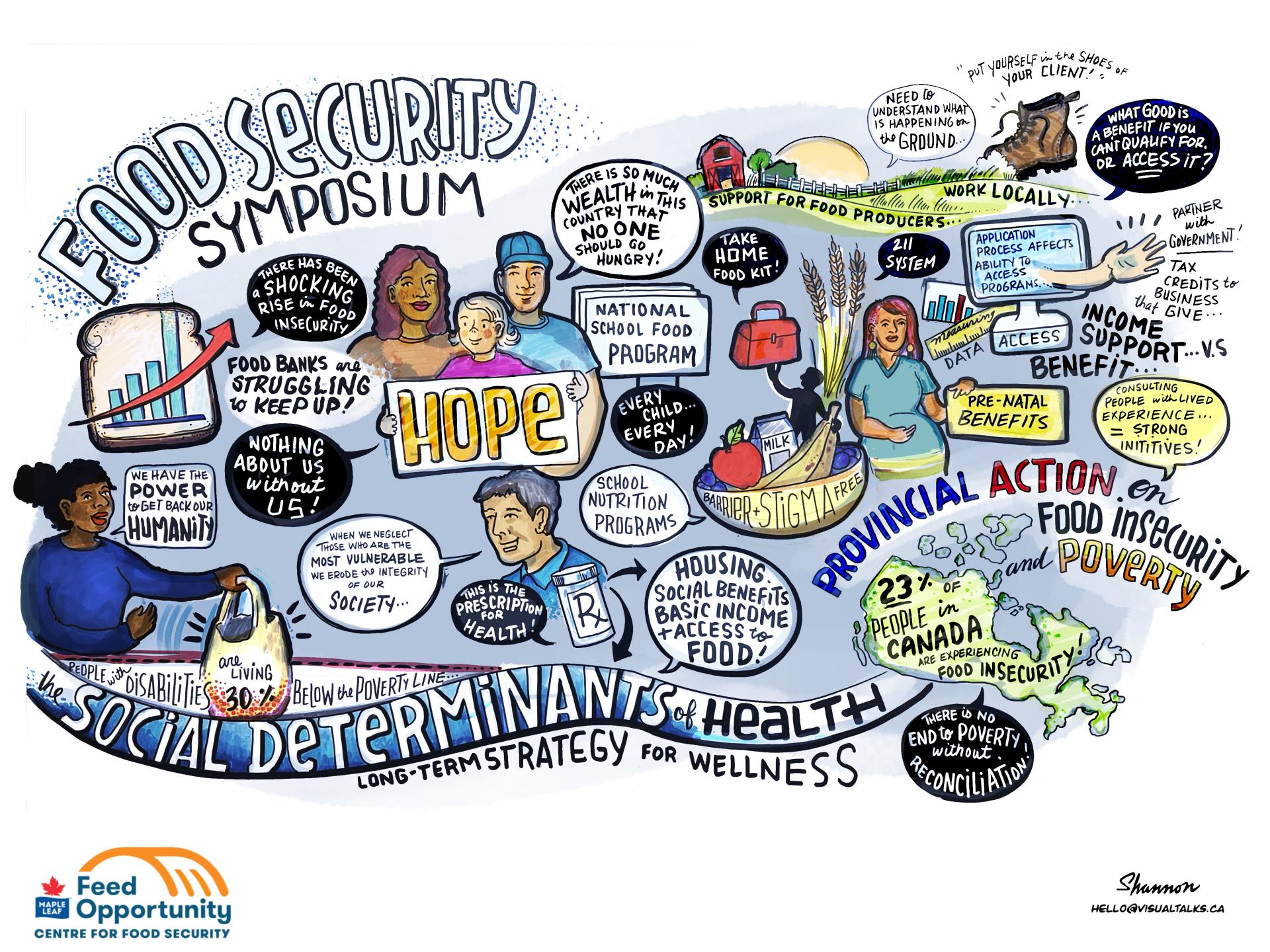
Below is what we covered in the day’s events.
Updates from the frontlines and food banks in Canada
The day kicked off with some updates from people working on the frontlines of issues connected to food insecurity. Thank you to Neil Hetherington, Chief Executive Officer of Daily Bread Food Bank, Rabia Khedr, National Director of Disability Without Poverty, and Debbie Field, Coordinator at the Coalition for Healthy School Food for helping to ground the audience in the challenges and opportunities they see daily.
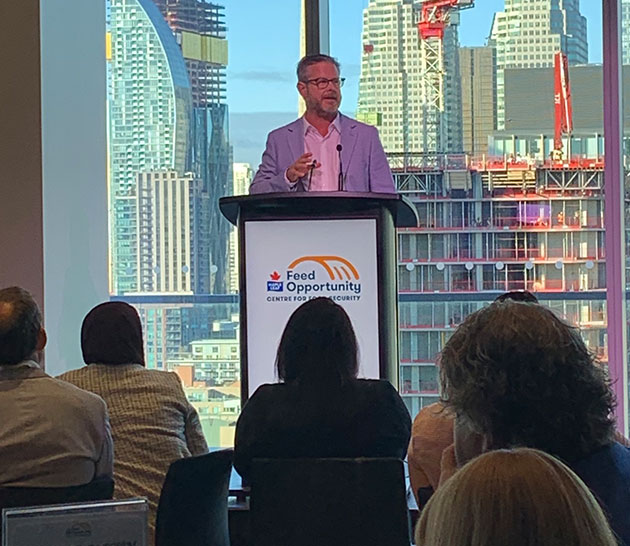
Neil shared some striking data: Daily Bread has seen client visits grow from 60K to 330K between 2020-2024; 1 in 10 Torontonians are relying on food banks each month; 12K-14K new clients have never used a foodbank before coming for the first time; and 59% of foodbank users have a post-secondary education — so the promise of education and employment has been broken.
Rabia noted that people with disabilities are living 30% below the poverty line, adding that people with disabilities, through their own efforts, have found that if the government helped them at least get to the poverty line, they could afford food.
Debbie shared some good news on Canada’s National School Food Program — the government has committed $1 billion over the next five years for this policy. “Low-income families agree that school lunches for children positively impact their families,” said Debbie.
We then heard from Michael McCain, Honorary Chair of the Centre, who discussed the enormous impact that food insecurity has on the health, life span, self-worth, academic success, and employment of Canadians. “As we neglect people when they are at their most vulnerable, we erode the integrity and strength of our society. We need more expansive, impactful solutions. Food insecurity will not be solved by food donations no matter how good those donations make us feel. We need to press for more equitable and healthier societies with a safety net no one falls below,” said Michael.
Provincial actions to address food insecurity and poverty
This year, the Symposium highlighted provincial actions underway in Manitoba, Ontario, and Newfoundland and Labrador. I was especially thrilled to invite the Honourable Dr. Andrew Furey, Premier of Newfoundland and Labrador, in conversation with David Herle, host of The Herle Burly and Curse of Politics podcasts.

“We can’t afford not to make these investments as they bring both economic and social returns,” said Dr. Andrew Furey
“We can’t afford not to make these investments as they bring both economic and social returns,” said Dr. Andrew Furey, regarding investments made to address the social determinants of health and improve well-being in his province. He also shared his eagerness to work collaboratively and to consider joining the Centre and other national food security organizations to set a target to reduce food insecurity by 50% by 2030.
We then heard from members of parliament across the provinces including Aisling Gogan, Assistant Deputy Minister in the Department of Children, Seniors and Social Development at the Government of Newfoundland and Labrador, Cordelia Clarke Julien, Assistant Deputy Minister, Social Assistance Programs Division in the Ontario Ministry of Children, Community and Social Services , and Julie Ketner, Executive Director of Legislation and Strategic Policy at the Department of Families in Manitoba.
Moderated by Kathleen Sullivan, our Vice President of Government and Industry Relations at Maple Leaf Foods, the panel discussed how their respective provinces are addressing food insecurity as a policy and social issue.
Julie shared what the Government of Manitoba is doing for its new universally accessible food nutrition program which makes food and snacks available to kids in grades JK-12. It’s free and stigma free, with $6M earmarked for schools in areas with the highest socio-economic need. “They’re also undertaking a weekend breakfast share program to give kids access to food over the weekend,” said Julie.
In Ontario, Cordelia explained that the provincial government is increasing rates for the Ontario Disability Support Program, with a 17% increase tied to inflation that increases annually. She adds, “This is helping individuals get into financial independence, as they can make up to $1K on their own without money being taken back.”
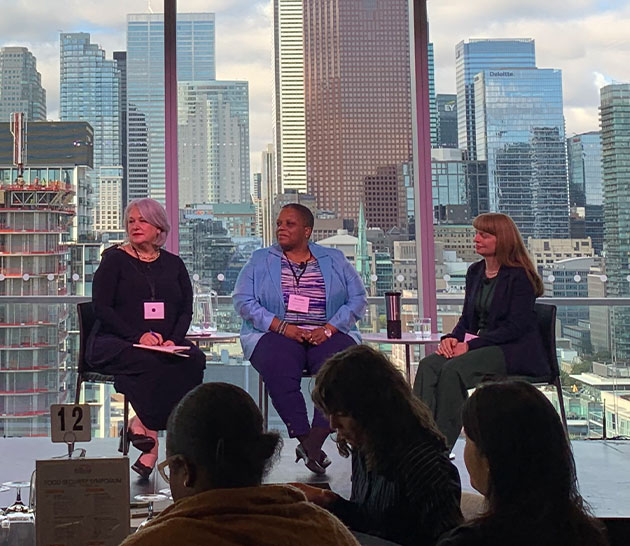
Over in Newfoundland, Aisling notes that government aims that supports are about “Simplicity for the individual who needs to apply for income support.” The Newfoundland government has committed to doubling its portion of the Canada Child Benefit (CCB), is expanding the Canada Prenatal Nutrition Program (CPNP) supplement from 0-1 to 0-5, and in June committed to providing double the Federal support for disability — when the Federal government gives $200, the provincial government will provide another $400.
Exploring food prescriptions in Canada and advancements in the U.S.
The next two sessions covered the topic of food prescribing, moderated by André Picard, National Health Writer at The Globe and Mail.
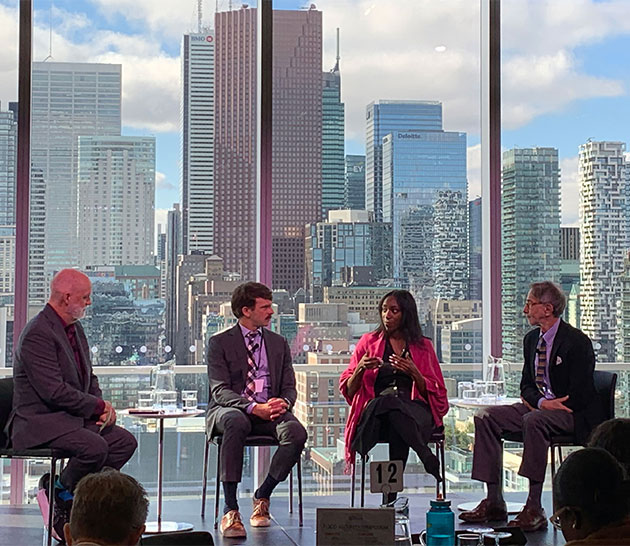
We started with a discussion about advancements in food prescribing in the United States as a means to address the epidemic of diet-related diseases. André chatted with Neal Curran, Director of Food Programs at Reinvestment Partners, Naomi Gunnell, Director of Strategic Initiatives at Walmart.org, and Corby Kummer, Executive Director of Food & Society at the Aspen Institute.
Their advice for introducing food prescriptions in Canada was robust. “Make your provinces see that prevention is one of the most important things that can be done,” said Corby. Naomi advised that we focus on collaboration: “Identify different groups and sectors that we’re hoping to see the impact on.” And Neal recommended that we think big: “It took over a year and a half from funds to first program because they prioritized the program, so do what you need to do to get it right the first time.”
We then discussed how to build the food prescribing movement in Canada. This is an area we have invested a lot of time on, so I was pleased to join Joseph LeBlanc, Associate Dean of Equity and Inclusion at NOSM University, and Zakiya Tafari, Executive Director of Afri-Can Food Basket for a discussion moderated by André Picard.
It was a conversation that reinforced the power of food and supporting culturally diverse food needs. As Joseph explains in his culture: “The word for medicine means the strength of the land, so food is medicine means that food is the strength of the land.” Zakiya added that, “It’s cultural foods that are being overlooked. Young children are growing up without food traditions — mangos are now overpriced and are no longer affordable so they’re becoming lost in communities.” This reinforced that food prescribing programs must help people consume the food that not only nourishes but holds importance in cultures across the country to achieve the best health outcomes.
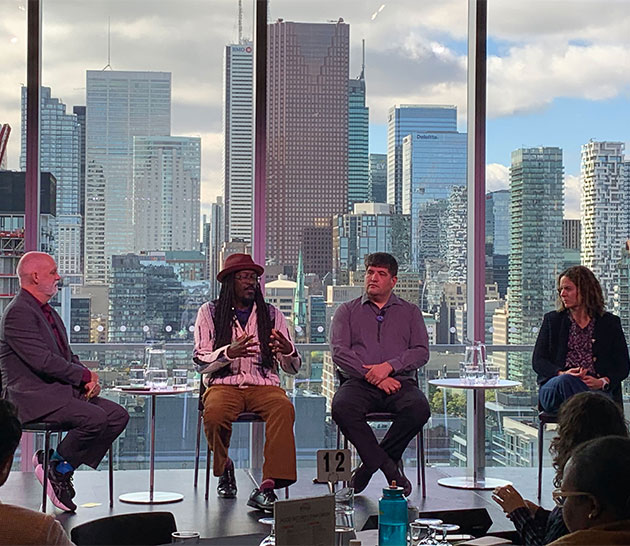
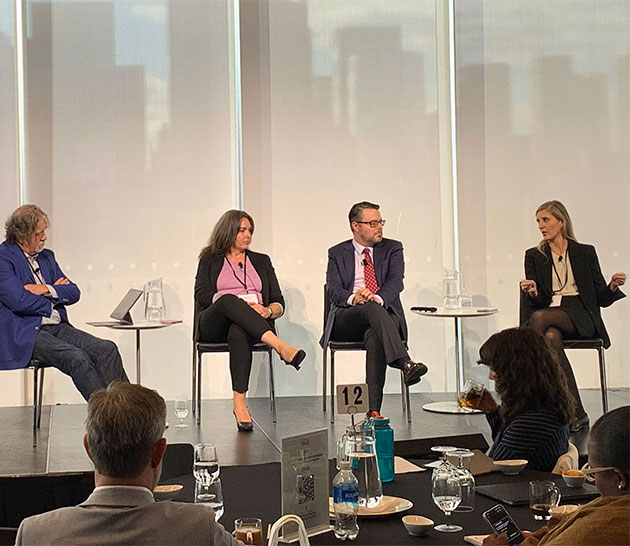
Our final session of the day was an invigorating live podcast recording of The Herle Burly, featuring host and moderator David Herle, along with Tyler Meredith, Partner at Meredith, Boessenkool & Phillips, Jennifer Robson, Associate Professor of Political Management at Carleton University, and Ginny Roth, Partner at Crestview Strategy.
They discussed the importance of targeting poverty to combat food insecurity. Click here to listen to the full live episode!
Thank you to everyone who joined us at our Food Security Symposium this year — it truly reinforced the urgency to work across sectors, including political parties and jurisdictions to implement scale solutions to reduce food insecurity in Canada and beyond.
October 28, 2024